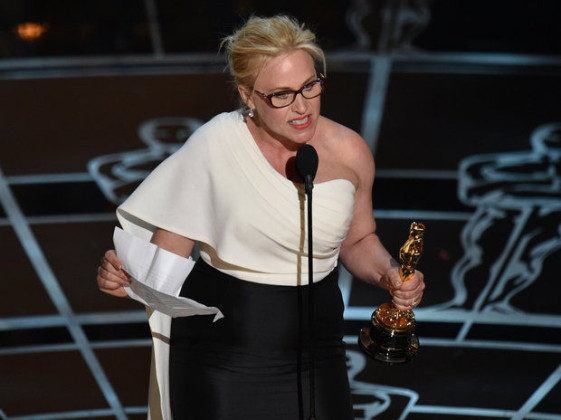We have a right to demand that solidarity and intersectionality not get thrown under the bus when a famous white woman speaks publicly on injustice.
Scarily, I finally have something in common with a Fox News pundit.
I found Patricia Arquette’s Oscars speech last night appalling. For some different reasons, though.
Arquette’s choice of words was abysmal. She failed to acknowledge the racial component of the wage gap—and it’s devastating. While white women earn 78 cents on the dollar as compared to white men, for women of color, it’s closer to 64 cents. Women, and in particular women of color, are earning advanced degrees at rates that surpass their male peers. Yet the number connected to what they make each year often does not reflect that. This is happening at every economic level of our society. If you are a woman, there’s a good chance you’ve faced this in your professional life. Goodness knows I have.
Let me be clear. I understand and recognize that pay inequality is a real issue that is not being sufficiently addressed in our culture. There are a number of reasons for that. A misinformation campaign is one—people often believe that pay inequality is based on factors like taking maternity leave or women wanting to work part-time, when in reality there is strong and solid data illustrating that the pay gap occurs amongst people working in the exact same professions with the exact same skill sets. It is upheld by corporate and organizational policies of wage secrecy, which prevent employees from speaking to one another about salaries.
Listening to Arquette, you would think that race didn’t exist or have economic impact—because she didn’t mention it. Let’s take a look at some of what she said:
“To every woman who gave birth, to every taxpayer and citizen of this nation, we have fought for everybody else’s equal rights,” shouted a fiery Arquette. “It’s our time to have wage equality once and for all and equal rights for women in the United States of America!”
First off, I believe that wage inequality shouldn’t be connected to a) whether or not you gave birth; or b) whether or not you are a documented citizen. I appreciate Arquette’s passion, but I am also confused by her assertion that “we”—and what she seems to be saying here is “white women”—have fought for everybody else’s equal rights.
Have “we?” I know plenty of white women and feminists who have prioritized their own issues and comfort levels for years before getting out in the streets and at the voting booth to stand up for people of color, queer people, undocumented folks, and others. I don’t see a groundswell of white women constantly standing up for others to their own detriment. And can’t we assume straight, white women is who Arquette meant, based on the fact that she also seemed to take pains to throw other movements (and intersectionality) under the bus? Take a look at this quote, from an interview after her speech with Us magazine:
“The truth is: Even though we sort of feel like we have equal rights in America, right under the surface, there are huge issues that are applied that really do affect women,” Arquette reflected. “And it’s time for all the women in America and all the men that love women, and all the gay people, and all the people of color that we’ve all fought for to fight for us now.”
I don’t feel like most folks in this country, especially marginalized people, “feel like we have equal rights in America.” I am offended by her statement that gay people and people of color need to fight for “us” now. For one thing, people of color and queer people are also quite often women, and quite often disproportionately affected by inequity and discrimination. And I don’t feel white women have been doing their best to fight and stick up for these groups of people at any point in history. We could stand to do much, much better.
As a white feminist, when I do stand up for groups I am not a part of (people of color, LGBT people) I don’t do it for cookies, accolades, bragging rights, or the position to later call those groups to task to stand up for “me” in whatever way I see fit. That’s exploitive and wrong in my opinion. I stand up for and with others because that is what I am morally compelled to do.
It’s possible that Arquette just chose terrible language with which to express herself, but the fact that white feminists and organizations across the country are exploding with uncritical, unrestrained joy at what amounts to a basic statement is unacceptable.
We have a right to expect more from public expressions of feminism. We have a right to expect thoughtful nuance. We have a right to demand that solidarity and intersectionality not get thrown under the bus when a famous white woman speaks publicly on injustice.
I hope that Arquette speaks on this issue again. I hope that she can view the critique she has been offered as a gift rather than an affront. I agree with her that women are grossly impacted by pay inequity. I just think she missed the main point: This is more grossly the case for women of color. I am grateful for the voices of Black Twitter and women of color feminists for calling her logic to task. I hope she can find some gratitude for that too, and incorporate it into her next public speech on the matter.
I also hope she can choose not to tell LGBT people and people of color what they should do and how they should do it for “us.”
Katy Otto is a writer, musician and activist living in Philadelphia. She runs a record label called Exotic Fever Records and plays in two bands, Trophy Wife and Callowhill.
Related Links:

